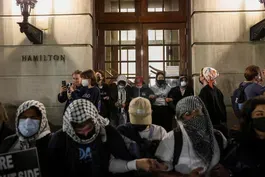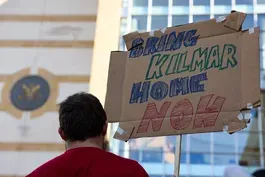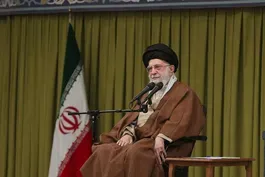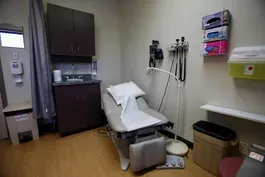
Grants frozen as Harvard pushes back against Trump's demands
Clip: 4/15/2025 | 6m 41sVideo has Closed Captions
Billions in grants frozen after Harvard pushes back against Trump's demands
Harvard became the first major school to push back against the Trump administration's efforts against colleges. The administration told Harvard it would lose federal funding if it didn’t change hiring practices and address allegations of antisemitism. But Harvard rejected that request, saying it can't "allow itself to be taken over." William Brangham discussed more with Cornell William Brooks.
Problems with Closed Captions? Closed Captioning Feedback
Problems with Closed Captions? Closed Captioning Feedback
Major corporate funding for the PBS News Hour is provided by BDO, BNSF, Consumer Cellular, American Cruise Lines, and Raymond James. Funding for the PBS NewsHour Weekend is provided by...

Grants frozen as Harvard pushes back against Trump's demands
Clip: 4/15/2025 | 6m 41sVideo has Closed Captions
Harvard became the first major school to push back against the Trump administration's efforts against colleges. The administration told Harvard it would lose federal funding if it didn’t change hiring practices and address allegations of antisemitism. But Harvard rejected that request, saying it can't "allow itself to be taken over." William Brangham discussed more with Cornell William Brooks.
Problems with Closed Captions? Closed Captioning Feedback
How to Watch PBS News Hour
PBS News Hour is available to stream on pbs.org and the free PBS App, available on iPhone, Apple TV, Android TV, Android smartphones, Amazon Fire TV, Amazon Fire Tablet, Roku, Samsung Smart TV, and Vizio.
Providing Support for PBS.org
Learn Moreabout PBS online sponsorshipWILLIAM BRANGHAM: Yesterday, Harvard University became the first major school in the U.S. to push back against the Trump administration's efforts against colleges and universities.
Last week, the administration told Harvard that nearly $9 billion of its federal funding would be in jeopardy if it didn't change its hiring practices and address allegations of antisemitism.
But Harvard rejected that request, writing that -- quote -- "Neither Harvard nor any other private university can allow itself to be taken over by the federal government."
The administration immediately froze $2 billion in federal grants to the school, and President Trump suggested the school should lose its tax-exempt status "if it keeps pushing political, ideological, and terrorist-inspired or supporting sickness."
Joining us now is someone from Harvard who supports the university's position.
Cornell William Brooks is a professor at the Harvard Kennedy School of Government.
Professor Brooks, very good to have you on the program.
Alan Garber, who's the president of the university, separately wrote -- quote -- "Although some of the demands outlined by the government are aimed at combating antisemitism, the majority represented direct governmental regulation of the intellectual conditions at Harvard."
Is that how you see it?
CORNELL WILLIAM BROOKS, Professor, Harvard Kennedy School of Government: I see it precisely that way.
And I have to commend President Garber for taking a financially, fiscally consequential stand a politically difficult decision, but one that was made morally simple by the fact that the Trump administration essentially demanded that Harvard essentially welcome the government into the regulation of Harvard, the management of Harvard, the hiring and firing of Harvard, the admitting of students at Harvard in a way that would be unprecedented.
To be clear about, this would be like alleging some violation of the law in terms of a company or a corporation, and thereafter the government demanding to run that company, run that corporation.
And that is unlawful, it's unconstitutional, and it is profoundly unfair.
WILLIAM BRANGHAM: I hear everything that you're saying, but, as you mentioned, this could be a fiscally very risky proposition.
I mean, some argue that it might be -- it's easy to support this idea now, but what happens if there is a suddenly $9 billion hole in your budget for all of that academic and scientific research?
Won't that make it very difficult to do your essential mission?
CORNELL WILLIAM BROOKS: Oh, most definitely.
Harvard does research on all manner of illnesses and diseases and conditions afflicting human society, certainly the country.
Harvard trains teachers that go into classrooms, public servants that twirl away in communities to address poverty, to address education, to address inequities in our society.
To lose $9 billion or to have $2 billion frozen affects the mission of the school.
But the magnitude of the pain, the size and scope of the risk is an indication of the threat.
and it is also a measure of the character of this university.
So, in other words, to have a school that's so committed to doing its work, it is willing to risk its financial existence, that's a measure of the threat that we face.
Let's be very, very clear about this.
When you look at the letter that the - - that was sent to Harvard, this list of demands are very loosely related in many cases and most instances, not related to antisemitism at all.
It has everything to do with literally poll testing, surveying the faculty, staff and students as to their political views, a clear violation of the First Amendment.
It would invite the government into choosing faculty, admitting students, choosing staff.
No university, no college, should be willing or can be willing to do such a thing.
WILLIAM BRANGHAM: In his letter to the administration, President Garber did say the university is addressing issues of antisemitism.
I hear your point that it was a minor part of the Trump administration's claim, but how serious a problem is antisemitism at Harvard?
Many people believe it is a very serious problem.
CORNELL WILLIAM BROOKS: I take the matter of antisemitism seriously.
There have been instances at Harvard in which Jewish students have felt threatened.
Jewish students have experienced mistreatment.
Jewish students have been treated in ways that are not commendable, as we have seen elsewhere in the country.
But the fact of the matter is, Alan Garber and his colleagues, people and the faculty and students, I might add, have taken steps in terms of addressing policies, coming up with programs, creating a body to study, analyze and propose responses to antisemitism at Harvard.
But note this.
The demands placed upon Harvard have nothing to do with antisemitism.
And as a civil rights lawyer, I'm going to be very clear about this.
I think it is an insult to the victims of discrimination to use their harms, to use their hurt to accomplish essentially an ideological, partisan political agenda at their expense.
WILLIAM BRANGHAM: You do have a significant slice of the population that believes that elite universities are liberally biased and that they're inculcating this world view into students.
How do you go about addressing that larger concern, separate from what the Trump administration is doing?
CORNELL WILLIAM BROOKS: Well, one of the things that you can do is that you can make sure that your hiring process is one in which you reach out to all parts of the country, all parts of the political spectrum and represent the full range of ideas in terms of hiring teaching faculty, research faculty and certainly everyone who is a part of this academic community.
Can we have more of that?
I suspect so.
But is anyone screening anybody else -- anybody out?
I don't think so.
And I want to be very clear.
I teach students from every corner of the country, all parts of the world, all across the political spectrum.
And it is an absolute joy.
So if there are ways in which Harvard can improve, big government, intrusive government and academic takeover are not the way to do it.
WILLIAM BRANGHAM: That is Cornell William Brooks at the Harvard Kennedy School of Government.
Thank you so much for being here.
CORNELL WILLIAM BROOKS: Thank you.
Thank you.
China cuts exports of rare earth minerals amid trade war
Video has Closed Captions
China cuts exports of vital rare earth minerals as trade war with U.S. intensifies (7m 37s)
How college communities are reacting to funding threats
Video has Closed Captions
How college communities are reacting to funding threats, international student arrests (5m 34s)
Inside the camp where Sudanese refugees have fled civil war
Video has Closed Captions
Inside the crowded camp where Sudanese refugees have fled violence and hunger (9m 57s)
Judge presses DOJ on wrongfully deported man
Video has Closed Captions
Judge presses Trump administration on why it hasn't returned wrongfully deported man (8m 54s)
News Wrap: Iran leader downplays chance of nuclear deal
Video has Closed Captions
News Wrap: Iran's supreme leader downplays chance of deal from nuclear talks with U.S. (4m 58s)
Why abortions are rising in U.S. despite more restrictions
Video has Closed Captions
Why abortions are rising in the U.S. despite more restrictions (7m 11s)
Providing Support for PBS.org
Learn Moreabout PBS online sponsorshipSupport for PBS provided by:
Major corporate funding for the PBS News Hour is provided by BDO, BNSF, Consumer Cellular, American Cruise Lines, and Raymond James. Funding for the PBS NewsHour Weekend is provided by...

















